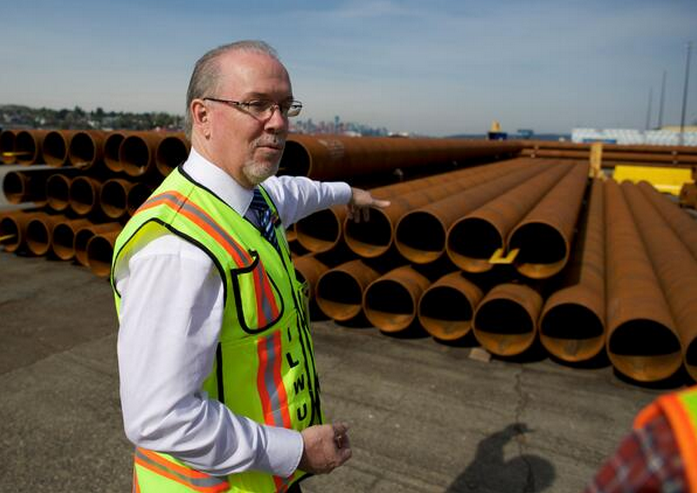Breaking
Liberals, NDP to debate proposed B.C. LNG deal during summer legislative session
VICTORIA — British Columbia’s politicians are returning to the legislature to debate the details of an agreement that could pave the way for the largest private investment in the province’s history — a proposed $36-billion liquefied natural gas export plant.
The Pacific NorthWest LNG project planned for Lelu Island near Prince Rupert still requires federal environmental approval, and Malaysian energy giant Petronas has yet to make its final investment decision.
But ratifying the project development agreement in the legislature provides investor certainty, Finance Minister Mike de Jong said.
“We think the stakes are big,” he said about the deal he will introduce this week though legislative sessions are not typically held in the summer.
“We are anxious to address the remaining issues that would lead to this particular project moving forward,” De Jong said.
He said the potential economic returns from B.C.’s first LNG deal would outweigh targeted-tax tradeoffs included in a 25-year deal that is detailed in a legislative document he will table in the legislature.
The project is estimated to create 4,500 construction jobs and could generate $9 billion in government revenues in a decade, de Jong said.
He said B.C.’s entire forest industry brought in between $550 million and $600 million for the province over the past five years.
The agreement includes assurances that Pacific NorthWest LNG will not face significant increases in specific taxes, including the LNG income tax, the carbon tax and the natural-gas tax credit, de Jong said.
It does not protect the company from increases in provincial sales and corporate taxes, he added.
Opposition NDP Leader John Horgan said what he’s seen of the agreement looks more like a sellout than a payoff for the province.
“I believe the (project development agreement), as it’s constituted, is in the interest of Petronas and not in the interest of B.C.,” Horgan said. “A quarter of a century tax holiday for a foreign company, no guarantees for direct jobs, no direct guarantee for local procurement. That strikes me as a failure all around and we’re going to be looking very hard at the legislation.”
He said the New Democrats’ conditions for support on LNG deals include agreement by First Nations, fair returns for the province, jobs for British Columbians and solid environmental controls.
“I support getting our resources to higher-priced markets,” Horgan said. “I support making sure the development of those resources is done by British Columbians. Temporary foreign workers are not the solution to a growing economy.”
The B.C. government has initiated a series of apprenticeship and skills and trades training initiatives at the secondary and post-secondary levels to increase the provincial labour pool in advance of an expected worker shortage in the oil and gas industry.
Premier Christy Clark has said LNG developments could result in up to 100,000 jobs. There are currently 19 LNG proposals underway, including the Petronas project, but none has reached the production stage.
Horgan said the Opposition also plans to use the summer legislative session to question the government on the ongoing scandal involving the firings of eight health researchers almost three years ago.
The government has asked ombudsperson Jay Chalke to conduct a second review of the matter but the NDP, the fired workers and their families are calling for a public inquiry.
One of the dismissed workers, Roderick MacIsaac, committed suicide after losing his job amid government accusations of inappropriate and possible criminal conduct involving drug research.






















